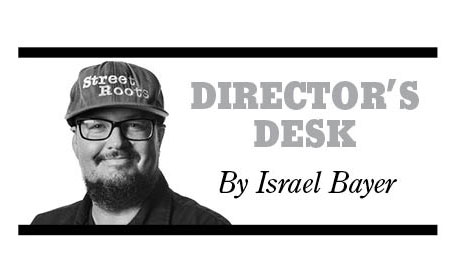Last week I wrote about my reflections and lessons learned from the relationships between advocates and elected officials. This week, I’m writing about when it’s time for community leaders to step aside in order to build and share power within our movement.
One of my first mentors on the streets was Genny Nelson, who co-founded Sisters of the Road in 1979.
Genny’s work in the community, along with many others, helped shape the relationship among advocacy, government and social services in Portland today, especially in the Old Town/Chinatown neighborhood.
One of the best attributes Genny had was passing along knowledge and helping mentor future generations on what it would take to build and maintain a housing movement. She took the time to not only speak truth to power and work to create systemic change in the community, but she also spent an enormous amount of time working with others who would eventually carry the torch of the work she had dedicated her life to.
One of the reasons Street Roots is successful today is because at the heart of the organization is the philosophy of nonviolence, being nonjudgmental and meeting people where they are at, regardless of their life circumstances. Genny’s guidance was critical in helping shape the Street Roots that you see today.
Genny Nelson’s mentors came out of the Depression era, including Dorothy Day, a woman who helped create the philosophy of using nonviolence in social work. Their mentors touched the work of Mother Jones and the abolitionist movement. All of the work we do today is connected to the past with the idea of being more effective and working toward creating social change in the future.
It’s my opinion that if you’re an executive director or an organizer or community leader and you’re not taking the time to mentor others around you and the next generation, you need to rethink things. We all need one another.
The last thing we need is people who are simply hanging on to something they don’t have the energy to lead. Nobody lasts forever, and if the goal is to maintain strength within an organization and in our movement, people shouldn’t feel threatened by creating room for others to share power and lead.
Part of the reason I’m stepping down at Street Roots is because I felt like I didn’t have the energy to effectively lead the organization into the next era. It wasn’t fair to either Street Roots or the people around me. It certainly isn’t fair to the people we serve.
So often I see the same executive directors delivering the same messages year after year without incorporating new leadership within their organizations or not sharing their assets with others in the community.
A shining example of this is the lack of sophistication with nonprofit leaders refusing to embrace technology and social media. Tools that younger generations use to effectively communicate with the masses.
One of the biggest reasons the public doesn’t understand the effectiveness of our movement is we are still trying to explain the complexity of housing through archaic avenues that never even reach broader audiences. It’s my opinion that storytelling and photography will go 10 times farther on social media and digitally than an executive director trying to explain the complexities of a housing system to a public that isn’t even listening.
Instead of holding on to these philosophies, nonprofit leaders would be wise to turn to the next generation to understand storytelling in the 21st century within their own organizations. By working together, organizations can find a way to share power within their own groups and empower others to take part in a broader movement and help deliver a message we are all trying to capture.
Of course, fighting poverty is bigger than social media or a website. That’s just one small example among a broad range of issues.
Oftentimes decision-makers, especially elected officials, are able to determine an advocate’s strengths and weaknesses in the community, and if you’re not evolving or you’re burned out, it shows. While we all come from different experiences, hope is going to be 10 times more inspiring than being cynical.
Being a leader at any level comes with an enormous amount of pressure and stress. It’s important to remember that nobody gets it right all of the time. In fact, part of being able to be innovative and effective is both admitting when you’re wrong and falling on your face a time or two. None of us are perfect. It’s OK to admit when you’re wrong, and it’s OK to fail.
The reality is people don’t believe in one person’s ideas or ability to lead — they believe in the idea of why people are doing something bigger than themselves. Given the chance, I believe the vast majority of humans want to do the right thing and help others in our community. They just need the time and space to do so.
None of the work we do comes without the power of a group of people or a coalition working together to support one another. There is no one voice or individual that carries the day. It takes all of us being leaders in the community to create social change.
That’s why I’m grateful for the gifts that Genny Nelson gave to Street Roots. Her mentorship of a few people allowed a lot of people in the end to benefit. It’s something we can all learn from.
I suppose my point in all of this is don’t be afraid to take the time to help others. Share your experiences. Your knowledge. Your life lessons. And work to give others the ability to carry the torch for the common good, knowing that the things we pass on today can go on to create amazing things tomorrow.
Israel Bayer is the executive director of Street Roots. You can reach him at israel@streetroots.org or follow him on Twitter @israelbayer.


